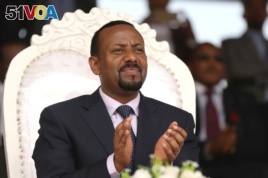11 October, 2019
Ethiopian Prime Minister Abiy Ahmed has won the Nobel Peace Prize in recognition of his efforts to end his country's border conflict with Eritrea.
The Norwegian Nobel Institute made the announcement on Friday. It also praised "the important reforms" that Abiy has launched in Ethiopia since becoming prime minister 18 months ago.
The prize comes as Abiy is facing pressure to defend the reforms he announced. Critics warn that his ability to deal with rising unrest in his country may be weakening.
The Nobel committee said some people may consider it too early to give him the peace prize, but added "it is now that Abiy Ahmed's efforts need recognition."
By choosing him, the committee showed its desire to give the award to individuals whose efforts need encouragement.
Reacting to the announcement, the 43-year-old leader said he was "humbled."
In a call with the Nobel committee, he explained his hope that the award would influence other African leaders "to work on (the) peacebuilding process on our continent."

Ethiopia's Prime Minister Abiy Ahmed
Actions as prime minister
Abiy Ahmed took office after large protests pressured the old ruling coalition and hurt one of the world's fastest growing economies. Africa's youngest leader quickly announced extensive reforms.
He surprised people by accepting a peace deal ending a 20-year border war between Ethiopia and Eritrea. Tens of thousands of people died in the conflict.
The two East African nations had not had diplomatic ties since the war began in 1998. Abiy once fought in a town that remained disputed at the time he accepted the peace deal.
Within weeks, the president of Eritrea, Isaias Afwerki, visited the Ethiopian capital, Addis Ababa. Communications and transport links were re-established. Families that had been divided for 20 years were reunited.
The improving relations led the United Nations to remove sanctions on Eritrea.
Ethiopia's reforms, however, do not seem to have led to changes in Eritrea. It remains a closed state and has closed the border with Ethiopia.
The Nobel committee pointed to Abiy's other diplomatic efforts in East Africa. He has tried to ease tensions between Eritrea and Djibouti and between Kenya and Somalia. He has also reached out to different sides in Sudan.
Ethiopia is Africa's second most populous nation, with about 110 million people.
Eritrea gained independence from Ethiopia in 1993 after a 30-year guerrilla war. About 80,000 people died in a war between the two sides from 1998 to 2000.
The Nobel committee noted that "peace does not arise from the actions of one party alone." It said that when Abiy "reached out his hand, President Afwerki grasped it, and helped to formalize the peace process between the two countries."
The committee added that it "hopes the peace agreement will help to bring about positive change for the entire populations of Ethiopia and Eritrea."
Reaction to the decision
Reacting to the Nobel committee's decision, Eritrea's ambassador to Japan offered congratulations, adding "tears have won again over evil."
Leaders in Africa, including those of Liberia, Ghana and neighboring Somalia, reacted with praise and encouragement. United Nations Secretary-General Antonio Guterres said the "winds of hope are blowing ever stronger across Africa."
The United States embassy in Ethiopia joined in the congratulations, noting the "progress" made under Abiy.
At home, the new prime minister offered one political surprise after another. He released tens of thousands of prisoners and welcomed home once banned political groups. He announced that Ethiopia would hold free and fair elections in 2020.
For the first time, the country had no journalists in prison, media groups noted last year.
The prime minister also announced the opening-up of Ethiopia's economy. He said private investment would be welcome in major state-owned businesses. The process continues slowly.
As Abiy enjoyed praise overseas, problems began in Ethiopia, mostly among different ethnic groups. Unrest has been an issue as formerly oppressed groups find they can freely demonstrate.
Some observers warn that the unrest will grow in the months leading up to the elections next year.
I'm Susan Shand.
The Associated Press reported this story. Susan Shand adapted it for VOA Learning English. George Grow was the editor.
Write to us in the Comments Section or on 51VOA.COM.
________________________________________________________________
Words in This Story
encourage – v. to make someone more hopeful or motivated
humble – adj. not pleased with oneself; not thinking of yourself as better than other people
sanctions – n. an order that is given to force a country to obey international laws by limiting or stopping trade with that country
grasp – v. to take and hold something
positive – adj. good or useful
journalist – n. a news reporter or other media worker